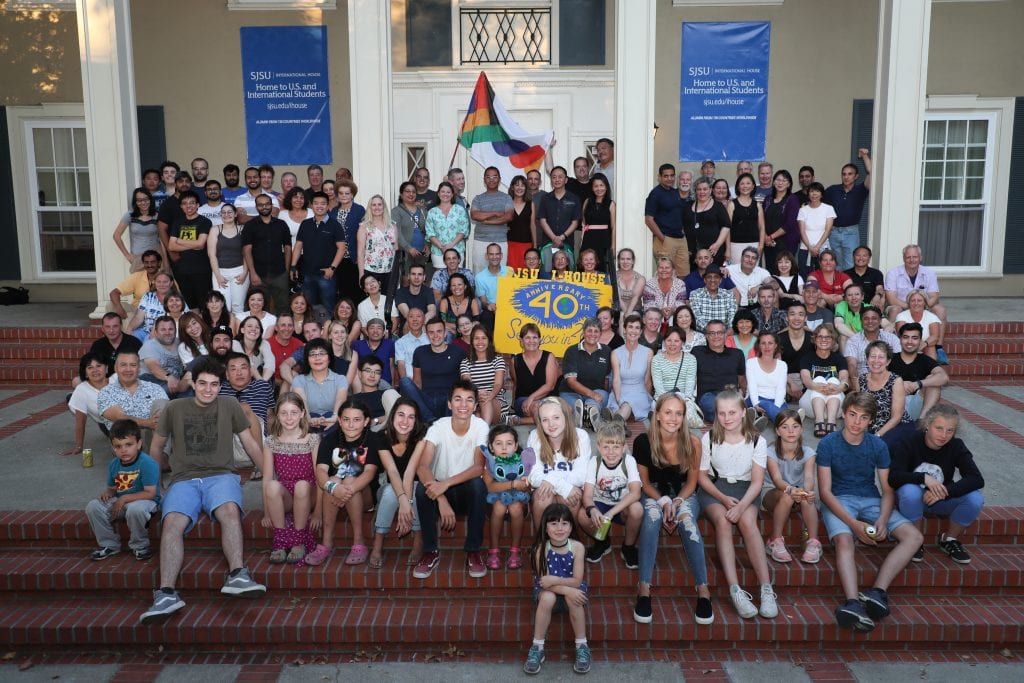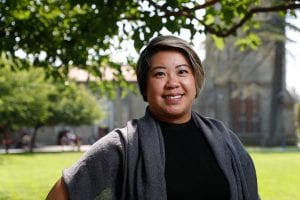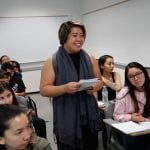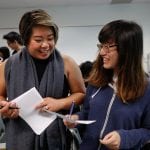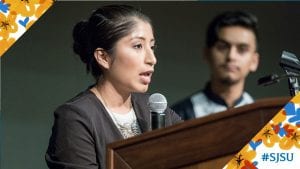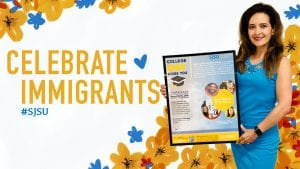-
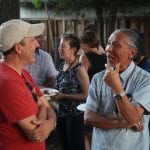
-
Nao Magami, at right, was one of the first students to stay at the International House. San Jose State University Alumni gather at International House for the 40th anniversary of the organization on Friday, Aug. 3, 2018. (Photo: Jim Gensheimer)
-
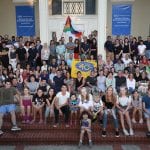
-
San Jose State University Alumni gather at International House for the 40th anniversary of the organization on Friday, Aug. 3, 2018. (Photo: Jim Gensheimer)
-
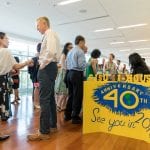
-
Alumni of SJSU’s International House check in for the 40th anniversary gala reunion. (Photo: David Schmitz)
-
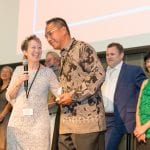
-
Director of International House Leann Chekasky Makhni, left, speaks on stage at the gala. (Photo: David Schmitz)
-

-
Four decades of alumni–and some family members–gathered for the 40th anniversary of SJSU’s International House. (Photo: David Schmitz)
-
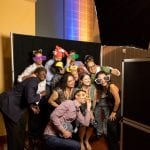
-
Alumni take a fun photo booth shot during the gala. (Photo: David Schmitz)
It was 1981. Bob Aron was a local student majoring in jazz. Yvette Young was from Panama and pursuing a degree in industrial management. For her, it made sense as a student from abroad to live at the International Center, now known as San Jose State University’s Phyllis Forward Simpkins International House. He ended up there as almost a fluke, when a friend who enrolled at SJSU the year before sent a dorm deposit to the wrong place and ended up with a spot reserved in the International Center instead of the residence halls. Aron visited is friend and thought it looked like a nice place to live so he signed up, too.
“It is crazy to live with a bunch of people from different places,” Aron said. “I grew up in the ’80s in California (when it wasn’t as diverse). It was the first time I met someone from Bangladesh. You start to realize how little you know.”
Aron, ’85 Music, and Young, ’84 Industrial Management, started dating all those years ago after meeting in the university residence and 37 years later, they are married and retired from lucrative careers – Aron from Apple and Young from the mortgage industry. They both served on the planning committee for the 40th Anniversary Alumni Reunion hosted August 1-5 that brought more than 200 former residents and their family members back to San Jose.
“If more people in the world had an opportunity to live in the International House, the world would be a better place,” said Leann Cherkasky Makhni, director of the I-House. “When people from around the world live together under one roof, we start to know each other as individuals and make lifelong friendships.”
Located on 11th Street, the house is noticeable for both the many columns that adorn the front porch and the flags that fly from the rooftop. Those who have resided within its walls over the past 40 years endearingly call it I-House. Founded in 1978 by SJSU Alumni Alan and Phyllis Simpkins, the couple was actively involved in the development of the housing program and maintenance of the facility. They donated the building to the SJSU Research Foundation in 1997. Around 4,000 students have resided in the home in the four decades since it opened.
The reunion began with a kick-off reception and alumni music program; a trip to the redwoods and steam train, complete with a beach bonfire and s’mores in Santa Cruz; bowling on campus, a barbecue at I-House and a pub crawl; a 40th Anniversary Gala Dinner where the Simpkins’ grandson Mike Bordoni spoke about his grandparents’ legacy; and farewell brunch to say goodbye at the end of the five day event.
Whether they stayed for one semester, or lived there while completing an undergraduate or graduate degree, all the alumni gathered for a recent afternoon of bowling at the Diaz Compean Student Union recall their time fondly, and for some, like Aron and Young, their experience changed the course of their lives.
Young recalled the day and weekend trips she and her fellow students took to San Francisco and Yosemite.
“Those are still very fond memories,” she said, mentioning a hike in Yosemite when the hikers were not equipped with enough water or the right shoes. “It was very memorable and I did things I’d never done before.”
The pair kept in touch with a core group through the years, and reconnected with more people from I-House on social media.
“Facebook came along and it got easier,” he said. “I like watching other people here who haven’t seen each other in years and its fun watching people from the different eras.”
Stijn Van Den Broek is one of those more recent residents. He visited SJSU for one semester as a foreign exchange student in fall 2014 from the Netherlands. A week in, he and the other residents went to Santa Cruz for a bonfire. He started talking with a German girl Michaela Fuhlert who complained about how noisy the people were in the room next door. It turned out to be Van Den Broek’s room. The two started dating immediately and got engaged the day of the gala at the beach where they had their first conversation. They currently live in Germany where Fuhlert is beginning a teaching career and Van Den Broek is pursuing a master’s degree in marketing communication.
For Fuhlert living in I-House was an adjustment not only to a new culture, but to living with a roommate.
“In Germany, you don’t have roommates at university,” she said, noting that the study abroad experience helped her mature. “You get more confident in handling things and it makes you grow up.”
The alumni who attended travel from as close by as San Jose to as far away as China, some with spouses and families in tow. At least 40 countries were represented at the reunion, with alumni traveling from more than 20 countries to be back at SJSU.
Hiroki Moriomoto attended SJSU in 2013-14 as a Teaching English as a Second Language student. He served as a resident advisor in I-House where he also made many friends.
“It was exciting to meet people from all over the world,” he said. “I’ve had the chance to travel with friends in Taiwan and Italy.”
Eldita Tarani, ’18 MA, came to SJSU from Kosovo in 2014 as a Fulbright Scholar in research and experimental psychology. She selected the I-House because she thought it would be a good experience.
“I-House is like a little family,” she said. “The best part of it is the diversity. It offers a family in a foreign land for strangers who have never been here before.”
She said while many of the other residents were younger than she was, she still managed to connect with many of them.
Many of the students credit Makhni with creating a warm and welcoming atmosphere.
“Leann has been running the house for the last 25 years and she does such a great job of maintaining the feeling of a home,” Aron said. “Everyone feels that way.”
“If more people in the world had an opportunity to live in the International House, the world would be a better place,” Makhni said. “When people from around the world live together under one roof, we start to know each other as individuals and make lifelong friendships.”
